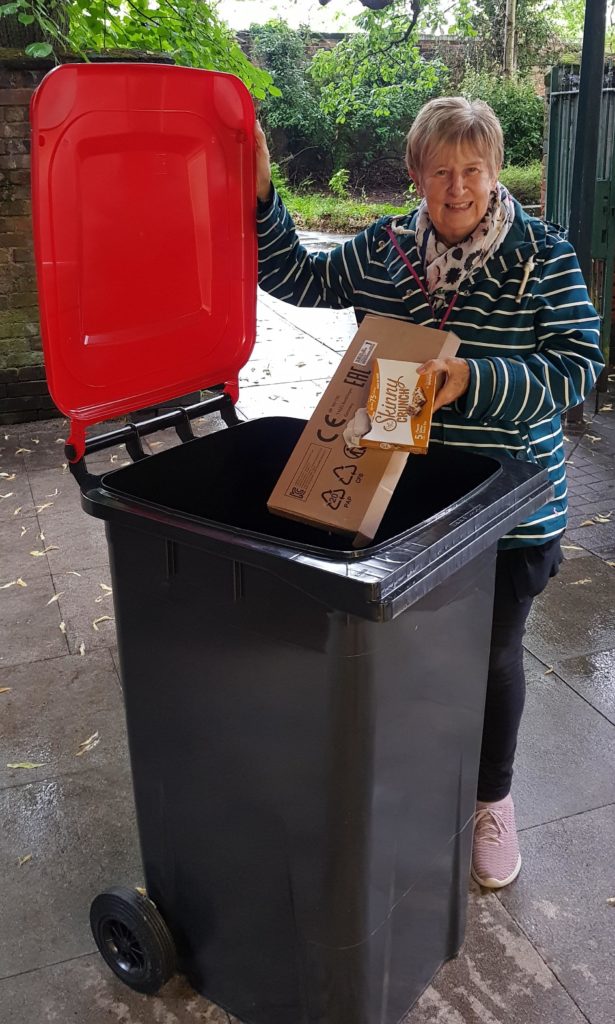Concerns over the falling value of recovered paper have contributed to North Warwickshire council’s decision to move to a fully commingled recycling service from its current twin-stream system.
Currently the council uses 55-litre bin ‘inserts’ which mean paper and card can be collected separately from other dry mixed recycling using just one container. Split-body collection vehicles are used to run the service.
However, under changes approved this month, inserts will be removed and from 1 November all recyclable materials will be collected as a mixed load using the current 240-litre wheeled recycling bins.
Around £75,000 could be saved annually through the new commingled service by reducing the amount of time taken by crews to complete collection rounds, according to research commissioned by the council from environmental consultant Frith Resource Management (FRM).
Currently paper and card is delivered to North Warwickshire’s transfer station at Lower House Farm, bulked and then sold on the market. The remainder of the dry mixed recycling is delivered to Suez’s Landor Street Materials Recovery Facility (MRF) in Birmingham.
The fluctuating value of recovered paper has been cited as one reason to end twin-stream collections. When the separate paper collections were introduced the council was hoping to benefit from the value of selling paper and card as a separate commodity, rather than having to sort it from other mixed materials.
Recovered paper value
The council acknowledged in a report on the move that the value of recovered mixed paper when the twin-stream collections were first introduced in 2013 stood at around £55 per tonne, increasing to around £75 per tonne in 2016, but has since dropped to around £18 per tonne.
This reflects wider strain within the paper recycling market. This week the European Recovered Paper Association (ERPA) warned of a “critical situation” faced by the European paper recycling sector which has pushed down the prices local authorities receive for paper and card they collect (see letsrecycle.com story).
North Warwickshire claims that the separate collections are costlier than a fully commingled service due to the time it takes to empty the bin inserts. It also said that the split body vehicles needed to operate the service are more costly to maintain and operate and can fill up ‘unevenly’ resulting in a reduced collection capacity.
Inserts
The paper and card wheeled-bin inserts are emptied into a separate container by collections crews before they are emptied into the recycling vehicle. Mixed recycling is simply emptied into the vehicle directly. North Warwickshire added that from a health & safety perspective, the use of single wheeled bins is preferable to inserts.
The split-bodied vehicles required for separate collections are more expensive to buy and maintain, North Warwickshire says – the report states there is an additional £45,000 to £60,000 cost per vehicle. The plastic inserts also break ‘frequently’ and the council replaces around 2,500 a year at a cost of £11,000, it noted.
Cllr Margaret Bell, chair of North Warwickshire council’s community and environment board, said: “It makes sense for the council to make this small but important change to the current recycling service which I have no doubt will have a big impact on savings.
“It makes sense for the council to make this small but important change to the current recycling service which I have no doubt will have a big impact on savings.”
“Removing the bin insert will allow the crews to carry out their collections more swiftly and hopefully make things easier for our residents to recycle at home, we all know time is precious and if we can make these small to help things happen quicker then it’s a positive all round.”
Commingling
Many households already receive commingled collections at present, despite the twin-stream system in place. Due to access issues at flats and isolated locations smaller vehicles are used for these collections, whilst vehicle maintenance can also result in split-bodied RCVs not being available.
In assessing the options on behalf of the authority, FRM undertook a TEEP (Technical, economical and environment practicability) assessment to ensure that the service fulfils the council’s duty to separately collect metal, glass, paper and plastic from the kerbside.
It concluded: “even when processing and disposal costs and material revenues are taken into account the commingled system remains the cheapest of the options. Switching to a kerbside sort system would entail higher annual costs and therefore the commingled option is the most cost effective in this modelling and preferable in this context.
“Economic and environmental grounds support and justify the proposed switch to a fully commingled service.”
The post North Warwickshire opts to end twin-stream recycling appeared first on letsrecycle.com.
Source: letsrecycle.com Waste Managment



